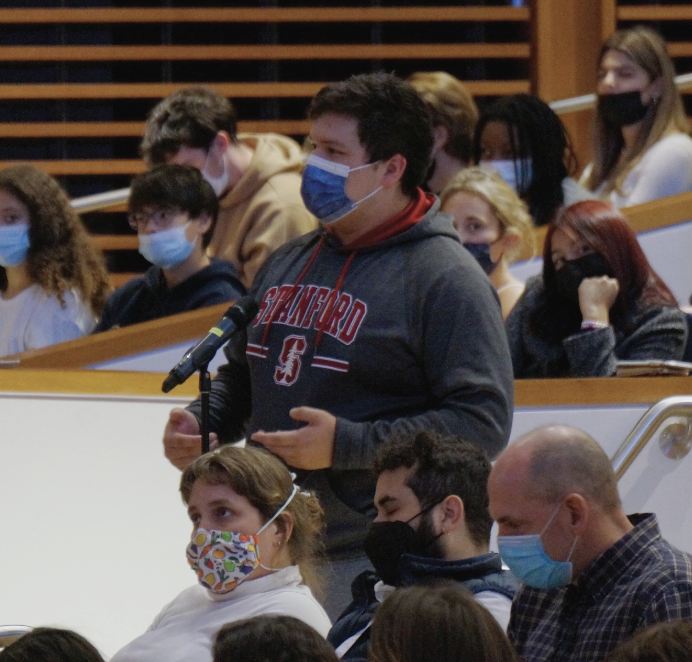
The second Community Conversation of the school year took place on Monday, November 1 and focused on socioeconomic class at Choate — a topic generated from a Google form submission process last year.
Many students felt as though this conversation was long overdue and have patiently waited for this opportunity to discuss socioeconomic class at the School.
Chloe Lewis ’22 said, “For so long I have felt like an imposter here, and I was really looking forward to this Community Conversation because I have always felt uncomfortable when people bring up the generalization that everyone comes from a place of privilege.”
Similar to the first Community Conversation of the year, questions submitted by community members were screened by the Dean of Equity and Inclusion Dr. Rachel Myers and Associate Director of Equity and Inclusion Mr. Filipe Camarotti to eliminate any offensive language. The questions were then placed in a bowl and drawn at random by audience members. Topics that were discussed included pressure points for students from lower-income backgrounds at Choate, strategies to save money at school, and socioeconomic assumptions made about international students.
HPRSS teacher Ms. Rachel Kesler found the question about money-saving tips at Choate thought-provoking. “It made me reflect on things that I did both growing up in college, and also that I still do now, that reflect what my socioeconomic background is and the ways in which some of that stuff isn’t conscious,” she said.
“The [question] about pressure points allowed people like me to explain our experience and how every single day is a pressure point because I know I am not here for the same reasons as other people,” added Lewis. “I have had to build a future for myself. Coming to Choate is a means of changing the course of life that I would have otherwise had.”
However, two questions regarding personal finance, rather than socioeconomic class, raised much controversy. One question asked for advice on how many credit cards one should have, while the other asked for help learning to investment money as a student. Some community members felt that these questions took time away from voices and stories that needed to be heard, and were somewhat irrelevant to the conversation at hand.
Lewis said, “It was definitely very triggering for me. I felt extremely uncomfortable and felt like I was crawling in my own skin and wanted to leave the room … watching people’s reactions to the questions and how they cheered and applauded for certain answers was kind of telling of the privilege at Choate.”
Others thought that moving through such questions helped the discussion reach a more eye-opening place. “I think we need to learn to read for subtext, as well as text,” said Mr. Minneman. “So if you just want to take out of it what those responses were, then that is for a financial advice column in the news. But if what you want is to understand the kinds of perspectives on money, and the assumptions [made] about how much money people have, those questions were incredibly illuminating.”
Furthermore, after the program, some students questioned whether the conversation topic should have focused primarily on the lower socioeconomic classes in order to amplify voices that aren’t often recognized at Choate. However, others pointed out that narrowing the scope of this topic can create further complications. Economics teacher Mr. Jesse Minneman said, “The danger of having [the Community Conversation] be low-income is that we don’t really know what social class is. It’s a hard thing to define, so where the line is on low-income is tricky.”
Nevertheless, the broad topic provided an opportunity for all members of the community to participate.“It was good that it was broad because everyone felt personally involved in it,” said Jane Rak ’23. “Socioeconomic class is an identifier we all carry, and I think this is why people are still having conversations about the topic.”
Across the board, though, students and faculty reported having found the Community Conversation proved to be emotional, uncomfortable, eye-opening, and freeing for members of the School, pushing students and faculty alike to reflect on their various backgrounds and experiences.
The upcoming Community Conversation will center around body image and will revert to the virtual set up of last year that took place last year’s Community Conversations due to the nature of the topic.
Dr. Rachel Myers said, “The Office of Equity & Inclusion doesn’t feel it’s the right decision to ask people to share perspectives on body image while also having their body on display for the whole school in Colony Hall.” In the virtual format, participants may turn off their cameras or use the chat function so as to allow all members to feel comfortable in the discussion.




